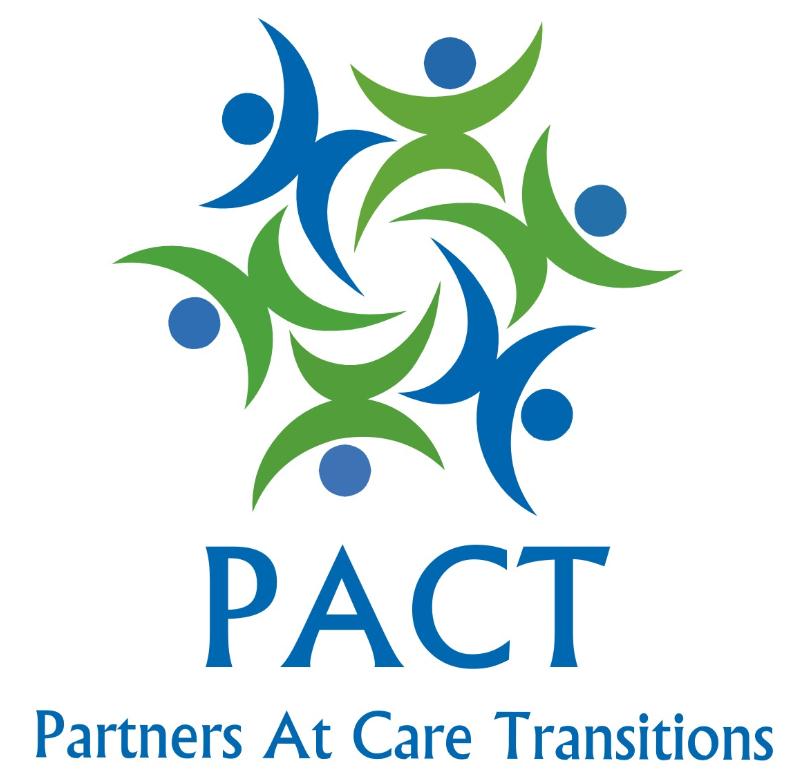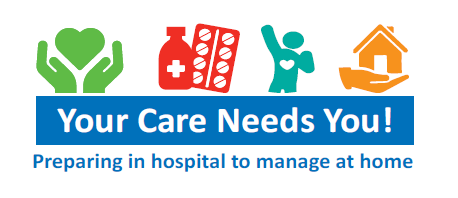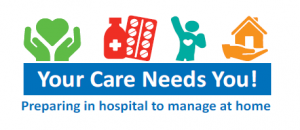Click on each of the tabs below to find out the most important things patients need to know and do in hospital relating to health, medicines, keeping moving, and getting home.
If you are a relative or friend and cannot visit the ward, you can use this information to guide you when you talk to ward staff on the phone.
All of the information shown here is available in booklet form and is given to patients during their hospital stay. Please ask staff if you did not receive a copy and would like one.
How to use this booklet
This booklet is for you, your family and friends. There are four parts to it:


![]()
![]()
Each part suggests things you could talk about with staff or family.
Write your own notes or things to talk about
Tick things you would like to talk to staff about
Keep this booklet with you to remind you what you would like to talk to staff about
You can download the full booklet here: YCNY booklet v6 29.08.23
This booklet helps you to know more and do more in hospital.
When you are unwell, it is normal to stay in bed and let hospital staff do things for you. As a result, you may not understand what has happened to you, and may lose the ability to do things you would normally do. This can make it more difficult to manage when you get back home.
Please use this booklet during your hospital stay. Staff can help you to do this. It may make it easier and safer for you to go home when the time is right.
 Understanding your health and care
Understanding your health and care
Knowing what’s going on now will make it easier when you get home
When you leave hospital you often still need care and treatment. So that you can look after your own health when you get home, it helps to know what has happened to you during your stay in hospital.
You can do this by:
- Talking to staff about any worries that you may have
- Being a part of discussions about your care
- Asking about what will help you at home (e.g. commode, walking aids, shower or toilet equipment)
- Thinking about what matters to you (e.g. things you would like to do at home)
I would like to talk about
Choose something to discuss or write what’s on your mind
- What am I being treated for?
- What is going to happen next?
- How long will I be in hospital for?
- What is being put in place to help me at home?
Keep this booklet with you to remind you what you would like to talk to staff about
 Medicines
Medicines
Knowing about your medicines and practising taking them in hospital means you will be ready to take them at home
When you are in hospital, medicines often change and staff manage them for you. It is easy for to lose track of what medicines you are taking, and get out of the habit of taking them yourself. This can make it difficult for you to take your medicines safely at home.
Staff can help you and your family understand and practise taking medicines while you are in hospital. You can help by talking to them about what medicines you normally take and how you take them.
I would like to talk about
Choose something to discuss or write what’s on your mind
- What am I taking and why?
- How and when do I take them?
- Have my medications changed?
- Can staff help me to practise taking my medicines in hospital?
Keep this booklet with you to remind you what you would like to talk to staff about
 Keep moving
Keep moving
If you get up and keep moving when you are in hospital this can help you recover more quickly and get on with your life at home
You might feel unwell or nervous, but research shows that it helps to get up and keep moving in hospital.
Talk to staff about what is safe for you to do, and ask whether your family and friends can help you. For example, is it safe for you to:
- Sit in a chair rather than lying in bed
- Dress in your own clothes and wash yourself
- Walk to the toilet or around the ward
- Walk along the corridor with family or friends
I would like to talk about
Choose something to discuss or write what’s on your mind:
- How can I help myself to get better?
- Can I walk to the toilet by myself?
- How can my family help?
- Can I leave the ward (e.g. for a walk or coffee)?
Keep this booklet with you to remind you what you would like to talk to staff about
Getting help at home
Knowing what to expect at home helps you get support if you need it
It is important to know what’s normal and what’s not, so you can get the right help when you need it. This might help you avoid going back into hospital.
Your patient advice sheet or discharge letter tells you about your hospital stay and helps you know what to expect following discharge. This makes it easier and safer for you to look after yourself at home.
What you should do with your patient advice sheet or discharge letter:
- Read it and show it to family or friends
- Show it to health professionals if you attend appointments
Your checklist for going home
Before going home (please tick):
- I know what symptoms to look out for
- I know how to take my medicines at home
- I know how to get new medicines
- I know what to do with old medicines at home
- I know when any appointments are
- I have asked someone to get supplies (e.g. milk, bread) for when I get home
- I have my patient advice sheet. I should ask staff for this at discharge
Talk to staff about this checklist
Getting help at home
If things don’t feel right, seek advice early
Pharmacy – Your local chemist can help with understanding your medicines and common illnesses
GP and Practice Nurse – If you struggle to get through to the surgery, keep trying! If you can’t get to the GP surgery, a doctor or nurse may be able to talk to you on the phone or visit you at home
Call NHS 111 – if you’re unsure or you urgently need advice but it is not a life threatening situation
Emergency department or 999 – for critical or life threatening situations
Charities and Volunteers – can help you at home (e.g. AgeUK, The British Red Cross, The Royal Voluntary service)
All rights reserved. This booklet was developed through independent research funded by the National Institute for Health Research (NIHR) Programme Grants for Applied Health Research (Partners at Care Transitions (PACT)): Improving patient experience and safety at transitions in care, RP-PG-1214-20017). The views expressed are those of the authors and not necessarily those of the NIHR or the Department of Health and Social Care.

North East- Newcastle & North Tyneside 2 Research Ethics Committee, Ref: 20/NE/0020. IRAS 277060.
V4 10/02/20
© Bradford Teaching Hospitals NHS foundation Trust




